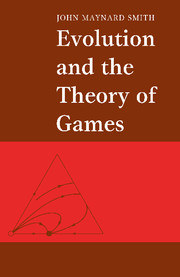Book contents
- Frontmatter
- Contents
- Preface
- 1 Introduction
- 2 The basic model
- 3 The war of attrition
- 4 Games with genetic models
- 5 Learning the ESS
- 6 Mixed strategies – I. A classification of mechanisms
- 7 Mixed strategies – II. Examples
- 8 Asymmetric games – I. Ownership
- 9 Asymmetric games – II. A classification, and some illustrative examples
- 10 Asymmetric games – III. Sex and generation games
- 11 Life history strategies and the size game
- 12 Honesty, bargaining and commitment
- 13 The evolution of cooperation
- 14 Postscript
- Appendixes
- Explanation of main terms
- References
- Subject index
- Author index
9 - Asymmetric games – II. A classification, and some illustrative examples
Published online by Cambridge University Press: 05 June 2012
- Frontmatter
- Contents
- Preface
- 1 Introduction
- 2 The basic model
- 3 The war of attrition
- 4 Games with genetic models
- 5 Learning the ESS
- 6 Mixed strategies – I. A classification of mechanisms
- 7 Mixed strategies – II. Examples
- 8 Asymmetric games – I. Ownership
- 9 Asymmetric games – II. A classification, and some illustrative examples
- 10 Asymmetric games – III. Sex and generation games
- 11 Life history strategies and the size game
- 12 Honesty, bargaining and commitment
- 13 The evolution of cooperation
- 14 Postscript
- Appendixes
- Explanation of main terms
- References
- Subject index
- Author index
Summary
In the last chapter, I discussed contests having a single asymmetry which is unambiguously known to both contestants at the start of the contest; the obvious example is the asymmetry between the owner of a resource and an intruder. A number of complexities arise in actual animal contests. The following classification is not exhaustive: it is intended mainly as a guide to Chapters 8–10.
1. A single asymmetry initially present, known certainly to both contestants.
(a) Asymmetry uncorrelated with payoff or RHP (‘resource-holding power’.
(b) Payoff and/or RHP differ between the two roles.
(c) Strategy sets as well as payoffs and RHP differ between the two roles (e.g. male–female and parent–offspring contests).
Types 1(a) and 1(b) were the topic of the last chapter. Type 1(c) is discussed in Chapter 10.
2. A single asymmetry present, but each contestant knows only its own state. This is the ‘game with random rewards’, which was discussed in Chapter 3, and Appendix G.
3. A single asymmetry present, but information about it is uncertain (e.g. differences in size or strength). Such contests involve a phase of ‘assessment’. Considerable theoretical difficulties arise if the information acquired during assessment is uncertain.
4. More than one asymmetry present.
This chapter deals with types 3 and 4. First, I discuss the case in which unambiguous information about the asymmetry can be acquired. This raises no particular difficulties; as expected, an assessed asymmetry can settle contests without escalation. Some illustrative examples are then discussed.
Information
- Type
- Chapter
- Information
- Evolution and the Theory of Games , pp. 106 - 122Publisher: Cambridge University PressPrint publication year: 1982
